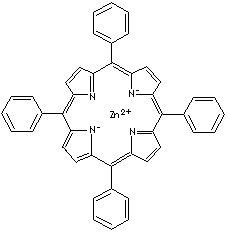PRODUCT IDENTIFICATION

H.S. CODE
TOXICITY
CLASSIFICATION
PHYSICAL AND CHEMICAL PROPERTIES
REFRACTIVE INDEX
Stable under ordinary conditions
GENERAL DESCRIPTION & APPLICATIONS
APPEARANCE
ASSAY (HPLC)
98.0% min
|
|
|
| ZINC meso-TETRAPHENYLPORPHINE | ||
|
PRODUCT IDENTIFICATION |
||
| CAS NO. | 14074-80-7 |
|
| EINECS NO. | ||
| FORMULA | C44H28ZnN4 | |
| MOL WT. | 678.12 | |
|
H.S. CODE |
||
|
TOXICITY |
||
| SMILES | ||
| SYNONYMS | ||
| Zinc(II) meso-Tetraphenylporphine; Zinc TPP; 5,10,15,20-tetraphenyl-21H,23H- Porphine, Zinc complex; | ||
| [5,10,15,20-tetraphenyl-21H,23H-porphinato(2-)-N(21)-,N(22)-,N(23)-,N(24)-]-, (SP-4-1)-Zinc; [5,10,15,20-tetraphenylporphinato(2-)]-Zinc; Zinc(II) alpha,beta,gamma,delta- tetraphenylporphine; Zinc tetraphenylporphine; [5,10,15,20-tetraphenyl-21H,23H-porphinato (2-)-N21,N22,N23),N24]-(SP-4-1) Zinc; (Tetraphenylporphinato) Zinc; | ||
|
CLASSIFICATION |
||
|
PHYSICAL AND CHEMICAL PROPERTIES |
||
| PHYSICAL STATE | purple crystalline powder | |
| MELTING POINT | ||
| BOILING POINT | ||
| SPECIFIC GRAVITY | ||
| SOLUBILITY IN WATER | Insoluble | |
| pH | ||
| VAPOR DENSITY |
|
|
| AUTOIGNITION |
|
|
| NFPA RATINGS | ||
|
REFRACTIVE INDEX |
||
| FLASH POINT |
|
|
| STABILITY |
Stable under ordinary conditions |
|
|
GENERAL DESCRIPTION & APPLICATIONS |
||
| Porphyrin is a class of cyclic tetrapyrrolic ring structure compounds joined by four methene bridges (=C-) through alpha-carbon atoms of four pyrroles. Porphyrins are water-soluble biological pigments occuring widely in animal and plant tissues to take part in important biological functions such as metal-binding cofactors in hemoglobins in the blood of animals, chlorophyll in plants for photosynthesis, and certain enzymes for cell respiration. Numerous types of porphyrins can be obtained through the modification of a natural porphyrins and total synthesis. Not only their chemical transformations through nucleophilic and electrophilic substitution, substituent modification, reduction, oxidation but also thier metalation and demetalation properties with iron, zinc, copper, nickel, and cobalt give valuable biological applications in molecular biology, fluoroimmunoassay and new pharmaceutical developments. | ||
| SALES SPECIFICATION | ||
|
APPEARANCE |
purple crystalline powder | |
|
ASSAY (HPLC) |
98.0% min |
|
| ABSORBANCE | 418 - 556 nm | |
| TRANSPORTATION | ||
| PACKING |
|
|
| HAZARD CLASS | ||
| UN NO. | ||
| OTHER INFORMATION | ||
| Zinc is an essential mineral having a role in the maintenance of the body's nervous and immune systems (T-cell function). This mineral is involved in the biochemical reactions as an antioxidant in the healing process and develops normal tissues Zinc is a cofactor in enzymatic reactions such as protein synthesis polymerases and in carbonic acid anhydrase. Zinc maintains the body's alkaline balance. Zinc finger, a structural domain found in many gene-regulatory proteins, is a component of hydrophobic hormones acting stabilizing the biomembrane structures and cell membrane metabolism. Zinc deficiencies may result in prolonged wound healing, delayed sexual maturation, mental lethargy, skin changes, and susceptibility to infections. Gluconate and citrate forms are mainly used as zinc supplements. They are easily absorbed by the body. | ||
|
|
|